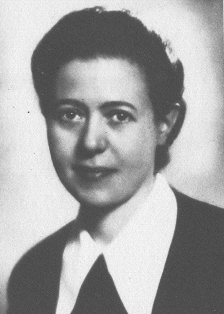It was in the autumn of 1940 when my mathematics teacher, Maria Neumann, opened the door of the 11th grade of LIT (this was the abbreviation for the Israelite High School in Timisoara), throwing on the chair, in a characteristic style, the catalog containing the names of students enrolled in science. I remember a few names: Abelsberg, Altmann, Koguth, Adler, Berger, Löbl. I did not suspect at that moment that meeting her would generate a lasting friendship that would leave strong marks on our future evolution.
Accustomed to the rigorous teaching style of the teachers I had at Constantin Diaconivici Loga High School, among whom I mention Coman, Cioflec and Iorgulescu, people with strong liberal beliefs, I was surprised from the first moment by the unconventional teaching style of this teacher, high grade in which she mastered the subject matter and last but not least the care she showed so that each of us not only understood what was taught, but could also apply it to solving the problems she proposed to us, carefully collected from collections of problems and from renowned magazines. As we numbered the problems solved, I often heard her say to me, "You've become a little lazy" when it seemed to her that the number of problems solved did not increase enough from one day to the next.
Feeling that she is not able to pass on enough knowledge to us in class, she invites us to her home on her free afternoons, where she solves new problems with a high degree of difficulty and introduces us to special chapters of mathematics that do not appear in the analytical program.
Seeing that I was interested in what she was teaching, little by little a friendship was forged between us, the subject of the problems we were discussing expanding towards literature and philosophy, fields in which she was very well versed. She suggested books for me to read, and repeatedly asked me: What does it mean to be a Jew? After long debates, we came to the following definition: "The Jew is the one who notices something where others do not yet see anything", widening Cioran's definition: The Jew is like yeast, he does not let the flour sleep.
I end with a message:
Dear Marika (you suggested that we put politeness aside in our discussions),
I suspect that where you stopped, you prepared a table and chairs, paper and writing tools so that all those of you who were teachers can continue to learn from you to be rigorous in everything we do, to continue discussions about the points, in which mathematics, physics, and humanity intersect, let's improve on the above definitions and give more than we are given, and maybe tell us, "You've become a little lazy".
Bernhard Rothenstein
